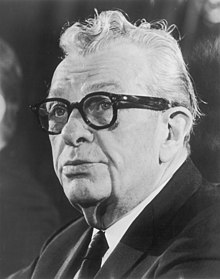
Back إيفريت ديركسن Arabic اڤيريت مكينلى ديركسين ARZ اورت دیرکسن AZB Everett Dirksen German Everett Dirksen Spanish اورت دیرکسن FA Everett Dirksen French אוורט דירקסן HE Everett Dirksen Hungarian Everett Dirksen Italian
Everett Dirksen | |
|---|---|
 Dirksen in 1968 | |
| Senate Minority Leader | |
| In office January 3, 1959 – September 7, 1969 | |
| Deputy | Thomas Kuchel Hugh Scott |
| Preceded by | William F. Knowland |
| Succeeded by | Hugh Scott |
| Senate Minority Whip | |
| In office January 3, 1957 – January 3, 1959 | |
| Leader | William F. Knowland |
| Preceded by | Leverett Saltonstall |
| Succeeded by | Thomas Kuchel |
| United States Senator from Illinois | |
| In office January 3, 1951 – September 7, 1969 | |
| Preceded by | Scott W. Lucas |
| Succeeded by | Ralph Tyler Smith |
| Member of the U.S. House of Representatives from Illinois's 16th district | |
| In office March 4, 1933 – January 3, 1949 | |
| Preceded by | William E. Hull |
| Succeeded by | Leo E. Allen |
| Personal details | |
| Born | Everett McKinley Dirksen January 4, 1896 Pekin, Illinois, U.S. |
| Died | September 7, 1969 (aged 73) Washington, D.C., U.S. |
| Political party | Republican |
| Spouse |
Louella Carver (m. 1927) |
| Children | 1 |
| Education | University of Minnesota |
| Military service | |
| Branch/service | United States Army |
| Years of service | 1918–1919 |
| Rank | Second Lieutenant |
| Battles/wars | World War I |
| This article is part of a series on |
| Conservatism in the United States |
|---|
 |
Everett McKinley Dirksen (January 4, 1896 – September 7, 1969) was an American politician. A Republican, he represented Illinois in the United States House of Representatives and the United States Senate. As Senate Minority Leader from 1959 until his death in 1969, he played a highly visible and key role in the politics of the 1960s. He helped write and pass the Civil Rights Act of 1964 and the Civil Rights Act of 1968, both landmark pieces of legislation during the civil rights movement. He was also one of the Senate's strongest supporters of the Vietnam War. A talented orator with a florid style and a notably rich baritone voice, he delivered flamboyant speeches that caused his detractors to refer to him as "The Wizard of Ooze".
Born in Pekin, Illinois, Dirksen served as an artillery officer during World War I and opened a bakery after the war. After serving on the Pekin City Council, he won election to the House of Representatives in 1932. In the House, he was considered a moderate and supported much of the New Deal; he became more conservative and isolationist over time, but reversed himself to support US involvement in World War II. He won election to the Senate in 1950, unseating Senate Majority Leader Scott W. Lucas. In the Senate, he favored conservative economic policies and supported the internationalism of President Dwight D. Eisenhower. Dirksen succeeded William F. Knowland as Senate Minority Leader after the latter declined to seek re-election in 1958.
As the Senate Minority Leader, Dirksen emerged as a prominent national figure of the Republican Party during the 1960s. He developed a good working relationship with Senate Majority Leader Mike Mansfield and supported President Lyndon B. Johnson's handling of the Vietnam War. He helped break the Southern filibuster of the Civil Rights Act of 1964. While still serving as Senate Minority Leader, Dirksen died in 1969.
The Dirksen Senate Office Building is named after him.